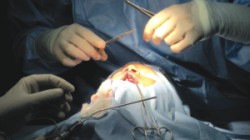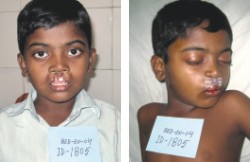|
Health
Cure for the Curse
Ershad Kamol
 |
A child with a cleft lip. |
"All of my relatives and neighbours blamed me for giving birth to a cleft lipped baby. They said it was because I had cut fish during the solar eclipse while I was pregnant," says Shabana Khatun from Pangsha Rajbari, describing the bitter experience that she faced when her son Rabbi was born four years ago, "The boy could not eat properly, nor could he articulate words due to his difficulties. The other children were afraid of him. As a result, he was completely isolated during the last four years before the successful surgery.
Rabbi's story is not any isolated incident. Being born with a cleft in a developing country is truly a curse. In the official website of Smile Train, an international charity organisation that supports free surgery and arranges training for the medical professionals in the developing countries states, " In fact, every baby born in Uganda with a cleft is given the name 'Ajok' which means literally, “cursed by God.” No one knows how many newborns with clefts are killed or abandoned right after birth."
Millions of children are suffering with cleft lip and palate, since it is a major problem in developing countries. Most of them cannot eat or speak properly. They are not allowed to attend school or hold a job. They face very difficult lives filled with shame and isolation. Having a cleft palate/lip affects a child's self-esteem, social skills, and behaviour.
The reason for this abnormality is yet to be completely discovered by the scientists, however, they have identified a few possible reasons behind such birth defects. According to scientific research, the development of the face is coordinated by complex morphogenetic events and rapid proliferative expansion, and is thus highly susceptible to environmental and genetic factors, rationalising the high incidence of facial malformations.
 |
A simple surgery can change a child’s life for the better. |
Genetic factors contributing to cleft lip and cleft palate formation have been identified for some syndromic cases, but knowledge about genetic factors that contribute to the more common isolated cases of cleft lip/palate is still sketchy. Apart from some unidentified genetic causes, the scientific research has identified toxic substances, environmental pollutants, and nutritional imbalance as the major causes of having cleft during the development of babies in the womb. The scientists blame some mothers for giving birth of babies having cleft since maternal smoking, alcohol and drugs abuse and hypertension contribute for not proper development of the complex mechanism of shaping the facial part of the babies in the womb. Other environmental factors that have been studied include: seasonal causes (such as pesticide exposure); maternal diet and proper vitamin intake.
In Bangladesh, no study has been done on the rate of birth having cleft and their social impact. But, according to medical professionals the country is well equipped for the treatment of cleft. But, poverty and taboos are the two major causes for the babies having such defects. Taking support from the international charity organisations about 10 NGOs are providing free treatment for the poor children in Bangladesh, however, existing facilities are not enough to mitigate the problem. Sometimes, the poor patients are exploited by such NGOs.
 |
Before surgery and after surgery |
"Such children and adolescents are at an elevated risk for developing psychosocial problems especially those relating to self-concept, peer relationships, and appearance. It is important for parents to be aware of the psychosocial challenges their adolescents may face and to know where to find professional help if problems arise. So, it is urgent for counselling of the parents and children who have such problems," says Professor Quazi Quamruzzaman, chairman of Dhaka Community Hospital that recently organised a weeklong free operation for cleft patients in collaboration with MERCY Malaysia an internationally renowned organisation.
Professor Zaman also emphasises campaigns in the media to dispel the social taboos for the proper rehabilitation of such patients. He also suggests involving the speech therapists to help recovering children to speak properly.
Copyright
(R) thedailystar.net 2010
|

